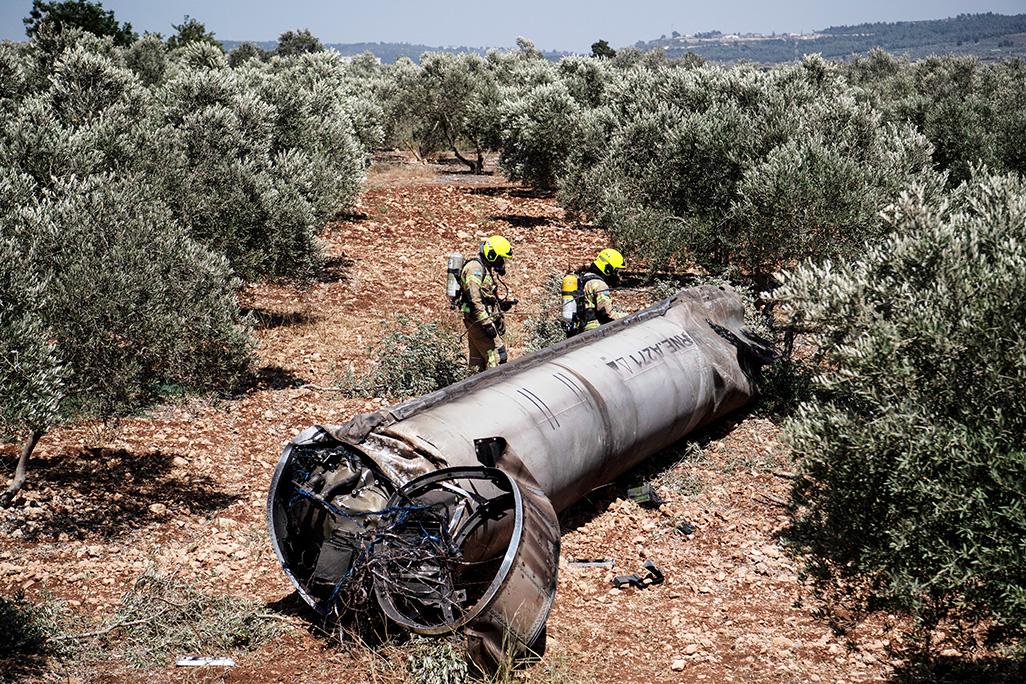Netanyahu says Iran will pay full price after hospital attack
Israel bombed nuclear targets in Iran on Thursday and Iran fired missiles and drones at Israel after hitting an Israeli hospital overnight, as a week-old air war escalated with no sign yet of an exit strategy from either side.
Following the strike that damaged the Soroka medical centre in Israel’s southern city of Beersheba, Prime Minister Benjamin Netanyahu said Tehran’s “tyrants” would pay the “full price”.
“Are we targeting the downfall of the regime? That may be a result, but it’s up to the Iranian people to rise for their freedom,” Netanyahu said. “Freedom requires these subjugated people to rise up, and it’s up to them, but we may create conditions that will help them do it.”
Defence Minister Israel Katz said the military had been instructed to intensify strikes on strategic-related targets in Tehran in order to eliminate the threat to Israel and destabilise the “Ayatollah regime”.
As darkness fell on Thursday evening, Iranian media reported air defences engaging “hostile targets” in northern Tehran.
Israel’s sweeping campaign of airstrikes aims to do more than destroy Iran’s nuclear centrifuges and missile capabilities. It seeks to shatter the foundations of Supreme Leader Ali Khamenei’s government and leave it near collapse, Israeli, Western and regional officials said.
Netanyahu wants Iran weakened enough to be forced into fundamental concessions on permanently abandoning its nuclear enrichment, its ballistic missile programme and its support for militant groups across the region, the sources said.
U.S. President Donald Trump, meanwhile, has kept the world guessing, veering from proposing a swift diplomatic end to the war to suggesting the United States might join it.
The White House said Trump would make a decision in the next two weeks.
“Based on the fact that there’s a substantial chance of negotiations that may or may not take place with Iran in the near future, I will make my decision whether or not to go within the next two weeks,” Press Secretary Karoline Leavitt told reporters on Thursday, citing a message from the president.
Three diplomats told Reuters that Trump’s special envoy Steve Witkoff and Iranian Foreign Minister Abbas Araqchi have spoken by phone several times since last week.
In an apparent reference to the U.S., Iran’s Supreme National Security Council said on Thursday it would use a different strategy if a “third party” joined Israel in the war.
STRAIT OF HORMUZ THREAT
Earlier, Israel said it had struck Iran’s Natanz, Isfahan and Khondab nuclear sites. It initially said it had also hit Bushehr, site of Iran’s only functioning nuclear power plant, but a spokesperson later said it was a mistake to have said this.
An Iranian diplomat told Reuters Bushehr was not hit and Israel was engaged in “psychological warfare” by discussing it. Any attack on the plant, near Arab neighbours and housing Russian technicians, is viewed as risking nuclear disaster.
A week of Israeli air and missile strikes has wiped out the top echelon of Iran’s military command, damaged its nuclear capabilities and killed hundreds of people.
Iranian retaliatory strikes have killed at least two dozen civilians in Israel.
On Thursday, Iran’s Revolutionary Guards said it had launched combined missile and drone attacks at military and industrial sites linked to Israel’s defence industry in Haifa and Tel Aviv.
Israel reported missiles launched from Iran towards its territory.
Iran has been weighing its wider options in responding to the biggest security challenge since its 1979 revolution. A member of the Iranian Parliament’s National Security Committee Presidium, Behnam Saeedi, told the semi-official Mehr news agency Iran could consider closing the Strait of Hormuz, through which 20% of daily global oil consumption passes.
‘STAY AWAY FROM OUR COUNTRY’
Israel, which has the most advanced military in the Middle East, has been fighting on several fronts since the October 7, 2023, attack on southern Israel by the Palestinian militant group Hamas triggered the Gaza war.
It has severely weakened Iran’s regional allies, Hamas in Gaza and Lebanon’s Hezbollah, and has bombed Yemen’s Houthis.
The extent of the damage inside Iran has become more difficult to assess in recent days, with the authorities apparently seeking to prevent panic by limiting information.
Iran has stopped giving updates on the death toll, and state media have ceased showing widespread images of destruction. The internet has been almost completely shut down, and the public has been banned from filming.
Arash, 33, a government employee in Tehran, said a building next to his home in Tehran’s Shahrak-e Gharb neighbourhood had been destroyed in the strikes.
“I saw at least three dead children and two women in that building. Is this how Netanyahu plans to ‘liberate’ Iranians? Stay away from our country,” he told Reuters by telephone.
Thousands of residents have fled Tehran, a city of 10 million, jamming the highways out.
Samira, 11, moved in with her grandparents in the northwestern city of Urmia after her family fled Tehran when a shopping centre near their house was struck. She said she has been unable to sleep at night.
“I’m afraid Israel will hit our home and my mom will die. I’m too scared. I just want to go home,” she said by phone.
Inside Israel, the missile strikes over the past week are the first time a significant number of projectiles from Iran have pierced defences and killed Israelis in their homes.
The director general of the Israeli hospital that was damaged in Beersheba, Shlomi Kodesh, told reporters at the site that a missile strike had destroyed several wards and wounded 40 people, mostly staff and patients.
Iran’s Revolutionary Guards said they had targeted Israeli military and intelligence headquarters near the hospital. An Israeli military official denied there were military targets nearby.
Missiles also hit a residential building in Ramat Gan, east of Tel Aviv.
“It’s very scary,” said Yaniv, 34, who lives nearby. He said he heard a deafening explosion when the missile hit, shaking his apartment tower.






Click here to change your cookie preferences